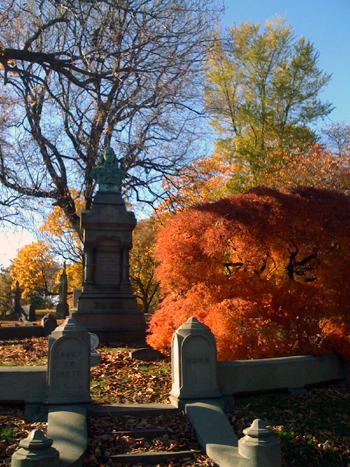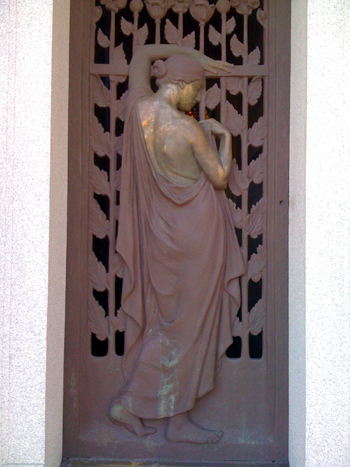To Autumn
It is important to feel the crinkle of autumn leaves beneath your shoes. It is important to step bravely forward, one foot behind the other. It is important to also pause, note the years that have passed all around you—1877, 1944, 1965—death by fire, loving parents, war veterans.
American cementaries are neighborhood parks. My high school faced one across the street. I'd imagine that like me, many kids have skipped a class or two for a rendezvous among tombstones and shapely willow trees. In Brooklyn it's no different, except Greenwood Cemetery feels like it unwinds on and on to destination unknown.
It's a pastoral scene, like you suddenly fell into a poem by Keats and all the leaves burn a bright orange red, and all the birds come alive, and all the deaths make such a splendor of life. It's nothing like the scene, you see, of driving two hours away from the city to a gravesite composed of neat rows of identical gray slabs of cement—to where grandfather was buried in China.
1.3 billion souls. 1.3 billion deaths. But it's quite a staggering scene when it's laid out in front of you, row after row of stones in a sea of gray. In the patch of space in front of Grandfather's tomb, auntie burned the fake money notes and places fruits and flowers.
I thought about how in the third grade, an essay in our textbook decried against superstitions and ancestor worship, and yet there we were still burning paper during the "day of the dead." Auntie took out a small broom and cleaned the dust off of grandfather tomb. It's a solemn affair in an even more solemn setting. There were no trees, no grass, no birds, no colors, just a heavy pall of tradition and ceremony in an atheistic country.
Back in Christian country, I am touched by the gothic architecture, the romantic curves of the stones and obelisks, and I think, just as the Ming and Tang poets have written about landscapes to death, is this what inspired "because I could not stop for death"?

